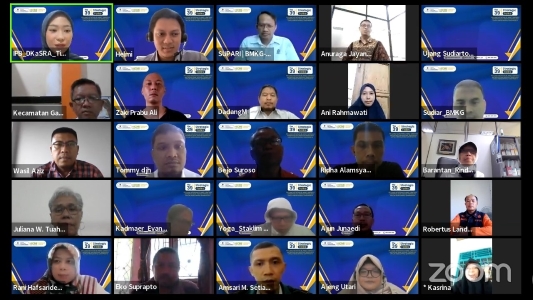IPB University Presents Experts, Reviews the Chance of El Nino Occurrence, Anticipatory Steps and Technological Innovations to Reduce Its Impacts

The Meteorology, Climatology and Geophysics Agency (BMKG) has announced that Indonesia will potentially experience an El Niño occurrence. El Nino occurrence in Indonesia will cause prolonged drought, a decrease in the amount of rainfall and rainy days, and an increase in air temperature.
In response to this, the Directorate of Strategic Studies and Academic Reputation (DKSRA) of IPB University in collaboration with the Association of Muslim Scholars throughout Indonesia (ICMI) Orwilsus Bogor organised The 39th Strategic Talks with the title ‘Opportunities for El Nino Occurrence, Anticipatory Steps and Technological Innovations to Reduce Its Impact’ (25/5) online.
“The topic of discussion this time is relatively actual because Indonesia is predicted to face El Nino so it requires in-depth study as an anticipatory step to reduce its impact,” said Director of KSRA IPB University, Prof Anuraga Jayanegara.
In her speech, Dr Heti Mulyati, the Vice Chair of Science and Technology of ICMI Orwilsus Bogor also stated that this discussion aims to gather the thoughts of experts to build ideas for anticipation strategies and launch technological innovations to reduce the impact of climate disasters.
One of the speakers, Dr Supari, Climate Variability Analysis Team, BMKG Climate Change Information Centre, revealed that the indicators of the emergence of El Nino in Indonesia are already visible. These indicators include the value of the sea surface temperature index (SML) Nino 3.4 began to increase. This indicates that the SML in the eastern Pacific region is above normal and the central part is also starting to warm up.
“Another indicator is that the transfer of hot water has been clearly seen through the Oceanic Kelvin Wave, and there have been two Westerly Wind Bursts during March and April 2023,” he added.
It is predicted that the intensity of El Nino in Indonesia in 2023 will be at a moderate level. “From August to October 2023, Sumatra, Java, West and East Kalimantan, East Nusa Tenggara and parts of Sulawesi will experience lower rainfall than usual,” Supari further explained.
Another speaker, Dr Haris Syahbuddin, Secretary of the Agency for Standardisation of Agricultural Instruments (BSIP), Ministry of Agriculture (Kementan) RI, explained that his office is preparing anticipation strategies in accordance with the categorisation of areas affected by El Nino. Areas in the green category will be monitored for rainfall information from BMKG and apply the right planting schedule and minimum risk.
“Furthermore, yellow category areas will be encouraged to utilise appropriate water harvesting infrastructure, more adaptive rice varieties, conduct monitoring and supervision, and anticipate water availability shortages. The red category areas will not be advised to plant rice so that food diversification such as tubers, sorghum, sago and others will be launched,” he added.
Meanwhile, Prof Imas Sitanggang, Professor of IPB University from the Department of Computer Science, Faculty of Mathematics and Natural Sciences (FMIPA) reviewed the innovations that have been prepared to help reduce the impact of El Nino. Reflecting on 2015, Indonesia experienced severe forest and land fires during the El Nino phase, so now innovations are needed to prevent forest and land fires.
According to him, the Karhutla Prevention Patrol Information System (SIPP) is one of the innovative measures used as a database for forest and land fire prevention patrols. There is also a temporal prediction model for groundwater levels in peatlands that uses Long Short-Term Memory (LSTM). In addition, there is the SiPongi website that can be used as a daily monitoring system for forest and land fires.
“This real time monitoring system and data analytics is one of the solutions in building an early warning system for forest and land fires so that the negative impacts can be minimised,” he explained.
Assistant Director for Strategic Studies, DKSRA IPB University, Dr Alfian Helmi as the moderator of this discussion asserted that efforts to anticipate and develop innovations to deal with El Nino that occurred in Indonesia need to be done by involving various actors collaboratively. (*/Rz) (IAAS/RUM)



